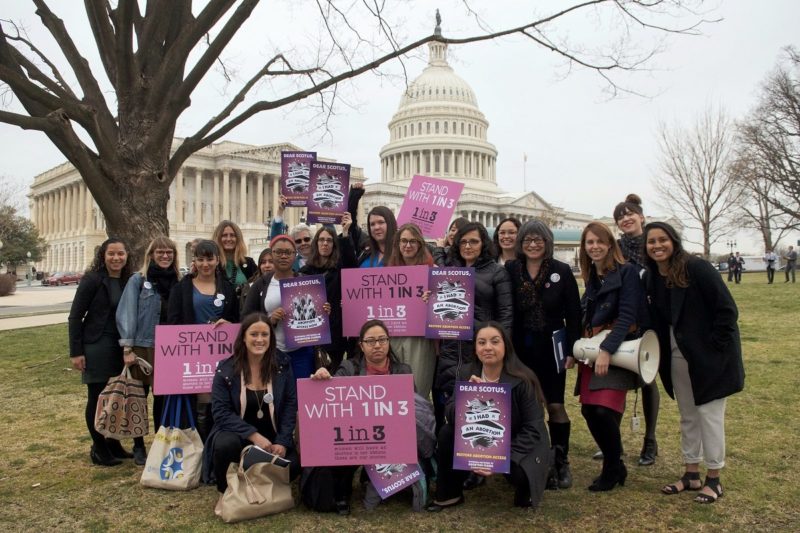Abortion Storytellers Gather as Anti-Choice Gorsuch Gets Senate Hearing
More than 1,200 people have shared their abortion stories through words and video since the 1 in 3 Campaign began five years ago.

More than two dozen people on Tuesday shared their abortion stories with lawmakers on Capitol Hill, while the Senate held confirmation hearings for anti-choice U.S. Supreme Court nominee Neil Gorsuch.
The congressional lobbying event, organized by Advocates for Youth, coincided with the reproductive and sexual health advocacy organization’s 1 in 3 Campaign “Stories from the Resistance” speak-out, which live-streamed on YouTube.
Julia Reticker-Flynn, youth activist network manager at Advocates for Youth, told Rewire in a phone interview that members of the 1 in 3 Campaign had planned to share their stories on the steps of the U.S. Capitol before meeting with lawmakers, but federal security officers thwarted that effort.
The speak-out was first held in 2014 and uses storytelling to help end abortion stigma and ensure the medical procedure remains legal and accessible. Organizers said the onslaught of GOP attacks on abortion care access made the campaign’s first-ever lobbying day necessary. Lawmakers, according to the 1 in 3 Campaign, need to “understand the personal side of an issue that has become a political pawn.”
“The campaign has resonated with young people because they’re looking for tools to have the conversation,” Reticker-Flynn said.
Reticker-Flynn said 30 women from Tennessee, Virginia, California, Illinois, and Nevada, among other states, met with 40 lawmakers on Tuesday, urging them to oppose Gorsuch. They asked legislators to vote against bills that could threaten safe, legal access to abortion care, she said.
National Partnership for Women & Families President Debra L. Ness issued a statement noting that Gorsuch reaffirmed his hostility toward reproductive rights at this week’s confirmation hearings.
Gorsuch “doubled down” on the position he took in the Hobby Lobby birth control case, Ness said. And while teaching at the University of Colorado, Gorsuch had encouraged students to be suspicious of women workers and to skirt fair employment laws, as Rewire reported.
Reticker-Flynn said this year’s event featured Muslim rights groups, Black Lives Matter, and other movements to show that Trump administration policies affect people “with complex lives and multiple identities.”
“Many communities are facing attacks from this administration,” she said. “We wanted to grow a thread and show the power in people sharing their stories.”
Pregnant people continue to be subject to medically unnecessary ultrasounds and forced waiting periods, along with 20-week bans and efforts to disseminate misinformation to pregnant people.
Republican state legislators have tried to ban abortion care outright. GOP lawmakers in Iowa, for example, attempted to end legal abortion statewide after introducing personhood legislation that would give a fetus the same rights and protections guaranteed in the U.S. and Iowa constitutions. That bill, SF 253, failed to clear a legislative procedural deadline.
Co-hosted by abortion storytelling advocate and National Network of Abortion Funds (NNAF) senior public affairs manager Renee Bracey Sherman, the “Stories from the Resistance” livestream featured abortion rights advocates from all walks of life.
Anne Hopkins, for example, shared her pre-Roe v. Wade abortion story, which took place in Tijuana, Mexico. Bracey Sherman discussed her post-Roe abortion, which she had at 19 while navigating a toxic relationship.
“I immediately knew that I wanted to have an abortion,” Bracey Sherman said. “It’s honestly one of the best health-care decisions that I’ve ever made and it’s one of the best experiences I ever had.”
She recounted details from the day of her procedure: how the nurse held her hand and how kind her doctor was. Despite growing up in a pro-choice family, she kept her abortion a secret for six years. This kept her from having her mother by her side during the procedure.
“It’s the only regret I have about my abortion,” said Bracey Sherman, who in 2014 co-wrote Saying Abortion Aloud, a report and set of recommendations for sharing personal abortion stories publicly.
During the “Stories from the Resistance” livestream, one woman talked about how she had to overcome “feeling guilty about not feeling guilty,” while another shared how having two abortions was the most selfless act she had taken in her lifetime.
Other speakers featured in the broadcast included Gretchen Borchelt of the National Women’s Law Center; Chitra Panjabi, president and CEO at Sexuality Information and Education Council of the United States; and D.C. Council Member David Grosso (I), who introduced the Universal Paid Leave Act that passed in December.
The NNAF has a tradition of encouraging abortion storytelling; the organization last year launched We Testify, a storytelling and leadership initiative representing a wide range of identities.
More than 1,200 people have shared their abortion stories through words and video since the 1 in 3 Campaign began five years ago, said Reticker-Flynn, who works with people ages 14-to-24.
The campaign’s name alludes to the pro-choice claim that 1 in 3 women will have an abortion by age 45.
The Guttmacher Institute contends that around 20 percent of U.S. pregnancies in 2014, excluding miscarriages, ended in abortion.
